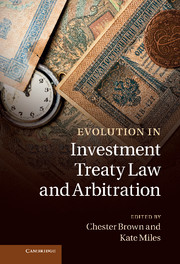Book contents
- Frontmatter
- Contents
- Contributors
- Editors' preface and acknowledgements
- Table of cases
- Table of Treaties
- Part I Introduction
- 1 Introduction: Evolution in investment treaty law and arbitration
- Part II Shifts in fundamental character
- Part III Actors in international investment law
- Part IV The new significance of procedure
- Part V Engagement with cross-cutting issues
- Part VI Conclusions
- Index
- References
1 - Introduction: Evolution in investment treaty law and arbitration
from Part I - Introduction
Published online by Cambridge University Press: 05 December 2011
- Frontmatter
- Contents
- Contributors
- Editors' preface and acknowledgements
- Table of cases
- Table of Treaties
- Part I Introduction
- 1 Introduction: Evolution in investment treaty law and arbitration
- Part II Shifts in fundamental character
- Part III Actors in international investment law
- Part IV The new significance of procedure
- Part V Engagement with cross-cutting issues
- Part VI Conclusions
- Index
- References
Summary
International investment law is a well-established discipline grounded in principles of customary international law that stretch back into the nineteenth century. In recent times, however, it has become quite evident that the law is in a state of flux. In particular, with the advent of investor–State arbitration in the latter part of the twentieth century, new levels of complexity, uncertainty and substantive expansion have been emerging. Indeed, in many ways, a discrete field of investment treaty law has developed, largely driven by the exponential growth in investment treaty arbitration over the last decade. Together with the continued proliferation of bilateral investment treaties (BITs) as well as the more recent trend of States concluding free trade agreements (FTAs) containing investment chapters, the now often very detailed reasoning set out in an increasingly large number of arbitral awards has contributed to rapid developments in the field. Such change has reached into almost all areas of investment treaty law and practice, encompassing the interpretation of substantive obligations, an intensified focus on procedural matters, the participation of new actors and the more nuanced content of recent BITs. In many investment treaty awards, the tribunals undertake a close examination of previous investment treaty decisions, leading to the creation of what is now being regularly described as an investment treaty jurisprudence.
This acceleration of activity does not, however, indicate consensus. On the contrary, investment treaty law and arbitration has very much become a high-profile area of contestation. In this regard, the controversy is not only reflected in the continuing debates on the implications of substantive rules, but there has also been a discernible shift towards the consideration of systemic issues, such as the ‘legitimacy’ of the investment treaty system, its interaction with other areas of international law, the role of economic development in the regime, the problem of inconsistencies in awards and related procedural issues such as challenges to arbitrators and the need for greater transparency. It is, therefore, an opportune moment to take stock of the point at which investment treaty law and arbitration has arrived and to reflect on the processes currently unfolding within the field.
- Type
- Chapter
- Information
- Evolution in Investment Treaty Law and Arbitration , pp. 3 - 16Publisher: Cambridge University PressPrint publication year: 2011
References
- 4
- Cited by



